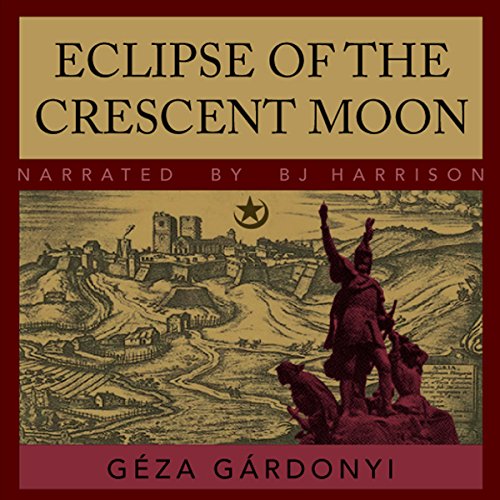
Eclipse of the Crescent Moon
A Tale of the Siege of Eger, 1552
Failed to add items
Add to basket failed.
Add to wishlist failed.
Remove from wishlist failed.
Adding to library failed
Follow podcast failed
Unfollow podcast failed
Buy Now for £14.99
No valid payment method on file.
We are sorry. We are not allowed to sell this product with the selected payment method
-
Narrated by:
-
B.J. Harrison
-
By:
-
Géza Gárdonyi
About this listen
It is 1541, and the crown of Hungary is up for grabs. King John, seeing that the Austrians are attacking with an innumerable force, petitions the Turks for assistance. King John then dies, leaving an infant son. While the Turkish army is en route, the Hungarians rally their forces, and beat back the Austrians themselves. Then, just as the Austrians are beating their final retreat, the main Turkish army arrives at the castle in Buda. And among their number is the sultan himself.
In the years that follow, the Turks relentlessly invade Hungary, their efforts culminating in the siege of the castle at Eger. The Turkish army numbers over 200,000. The Hungarian defenders number only 2,000. Now it's your turn to take part in the adventure, and journey to the land of medieval Hungary.
©1991 George F. Cushing (P)2010 B. J. HarrisonWhat listeners say about Eclipse of the Crescent Moon
Average customer ratingsReviews - Please select the tabs below to change the source of reviews.
-
Overall5 out of 5 stars
- Alexander
- 30-04-12
Masterful, moving, instructive
Mr. Harrison delivers a striking, masterful reading of this fantastically stirring and rich historical novel. The author (Géza Gárdonyi, 1899) of this originally-serialized work set out to illustrate three wonderful things:
- humanly, how a bold boy and girl (Gergely and Éva, whose romance is traced wonderfully over two decades) can overcome all manner of obstacles to grow into a great man and woman;
- historically, how the tide of Hungarian — and wider European — history was turned by the supreme efforts of a few, at a time when it seemed the Ottoman Turks were going to completely overrun Christendom and when patriots and leaders were few and far between;
- and universally, how men can fiercely love and defend their country without losing their compassion or their understanding that God created the enemy, too.
In all of these aspects, Gárdonyi succeeded in crafting a masterpiece that Mr. Harrison’s reading does great justice to.
The backdrop is the early Reformation in the 1530s to 1550s and the tragedy of Hungary’s shattered state, with the author making a number of knowledgeable, sympathetic sketches of Lutheran, Roman Catholic, Muslim, Gypsy and agnostic characters and their motives. There is a thrilling extended adventure in Constantinople (İstanbul) in the middle of the book, full of detail, which Gárdonyi carefully researched by visiting the city. A great number of nationalities, technologies, artefacts, inventions and new ideas feature in the narrative, but it never feels overloaded, thanks to the careful pacing of author and narrator and the self-contained action of each chapter.
Mr. Harrison is spot-on in his Hungarian and Turkish pronunciation (no mean feat) and perfectly, colourfully captures the intonations so typical of each language. (Only a few Latin terms are mispronounced, with some final ‘-e’s dropped and some first syllables wrongly stressed.) The translation, too (George F. Cushing, 1991), is rich, engaging, accurate and idiomatically spot-on.
Something went wrong. Please try again in a few minutes.
You voted on this review!
You reported this review!
1 person found this helpful


